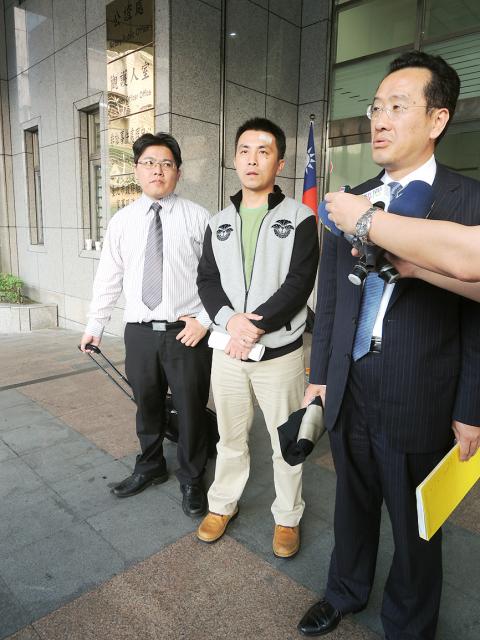The Taipei District Court on Friday ruled that the Taipei City Government must pay NT$300,000 in compensation to a man who was beaten by police during a crackdown on the Sunflower movement protests at the Executive Yuan in March and April last year.
Lin Ming-hui (林明慧), a teacher from Taichung, filed the suit alleging excessive use of force in violation of the Act Governing the Use of Police Weapons (警械使用條例).
Lin sought compensation from the Executive Yuan, Taipei City Government, National Police Agency and Taipei City Police Department.

Photo: Chang Wen-chuan, Taipei Times
Lin said he took part in a sit-in protest at the Executive Yuan on March 24 last year.
“The protesters sat on the ground peacefully, and nobody had a weapon. But the riot police used violent tactics and wielded batons, striking people,” he said.
A picture of Lin walking away to receive medical treatment, his face and clothing covered in blood, was among the most prominent photographs featured in media coverage of the protesters’ occupation of the Executive Yuan.
Following Friday’s ruling, Taipei Mayor Ko Wen-je (柯文哲) said that his government would not appeal the decision.
Lin said he wants to salute the judge for the decision, as winning the case has symbolic meaning.
“However, the government is still applying the same old authoritarian thinking to the current protest by high-school students against textbook curriculum guideline changes,” he said.
Lawyer Wellington Koo (顧立雄) said the ruling was to rectify the government’s unlawful actions and could be used for reference in future litigation.
“It was regrettable that the court did not hold former premier Jiang Yi-huah (江宜樺) responsible, as he ordered the police to remove the protesters,” Koo said.
The ruling cited the use of excessive police force against protesters, as Lin was holding on to another person next to him when police tried to disperse the crowd by pulling them away one by one.
“Police may use physical force to remove and carry people away, but when using batons, the officers should only have struck at Lin’s hands, and not at his head,” the ruling said.
It added that in Lin’s case, the officers had violated Articles 9 and 10 of the Act Governing the Use of Police Weapons, which state: “The police should avoid using lethal force unless the situation is so imminent that the lives of officers or bystanders are being threatened,” and “after using the police weapons, the police officer must report his/her use to his/her immediate supervisors except for using a baton as a way to give directions.”
Throughout the hearing and investigation, the police force did not take steps to identify the officer who hit Lin. Instead, it gave the captain of the riot police squad two demerits as punishment.
Lin’s lawyer, Lu Chiu-yuan (呂秋遠), said that was not good enough.
“It has been over a year since the incident, but police are still unable to find out the identity of the officer,” he said. “I hope Mayor Ko can help to find the officer responsible, because we must not let taxpayers foot the bill for police violence.”

PREPAREDNESS: Given the difficulty of importing ammunition during wartime, the Ministry of National Defense said it would prioritize ‘coproduction’ partnerships A newly formed unit of the Marine Corps tasked with land-based security operations has recently replaced its aging, domestically produced rifles with more advanced, US-made M4A1 rifles, a source said yesterday. The unnamed source familiar with the matter said the First Security Battalion of the Marine Corps’ Air Defense and Base Guard Group has replaced its older T65K2 rifles, which have been in service since the late 1980s, with the newly received M4A1s. The source did not say exactly when the upgrade took place or how many M4A1s were issued to the battalion. The confirmation came after Chinese-language media reported

A Ministry of Foreign Affairs official yesterday said that a delegation that visited China for an APEC meeting did not receive any kind of treatment that downgraded Taiwan’s sovereignty. Department of International Organizations Director-General Jonathan Sun (孫儉元) said that he and a group of ministry officials visited Shenzhen, China, to attend the APEC Informal Senior Officials’ Meeting last month. The trip went “smoothly and safely” for all Taiwanese delegates, as the Chinese side arranged the trip in accordance with long-standing practices, Sun said at the ministry’s weekly briefing. The Taiwanese group did not encounter any political suppression, he said. Sun made the remarks when

The Taiwanese passport ranked 33rd in a global listing of passports by convenience this month, rising three places from last month’s ranking, but matching its position in January last year. The Henley Passport Index, an international ranking of passports by the number of designations its holder can travel to without a visa, showed that the Taiwan passport enables holders to travel to 139 countries and territories without a visa. Singapore’s passport was ranked the most powerful with visa-free access to 192 destinations out of 227, according to the index published on Tuesday by UK-based migration investment consultancy firm Henley and Partners. Japan’s and

BROAD AGREEMENT: The two are nearing a trade deal to reduce Taiwan’s tariff to 15% and a commitment for TSMC to build five more fabs, a ‘New York Times’ report said Taiwan and the US have reached a broad consensus on a trade deal, the Executive Yuan’s Office of Trade Negotiations said yesterday, after a report said that Washington is set to reduce Taiwan’s tariff rate to 15 percent. The New York Times on Monday reported that the two nations are nearing a trade deal to reduce Taiwan’s tariff rate to 15 percent and commit Taiwan Semiconductor Manufacturing Co (TSMC, 台積電) to building at least five more facilities in the US. “The agreement, which has been under negotiation for months, is being legally scrubbed and could be announced this month,” the paper said,